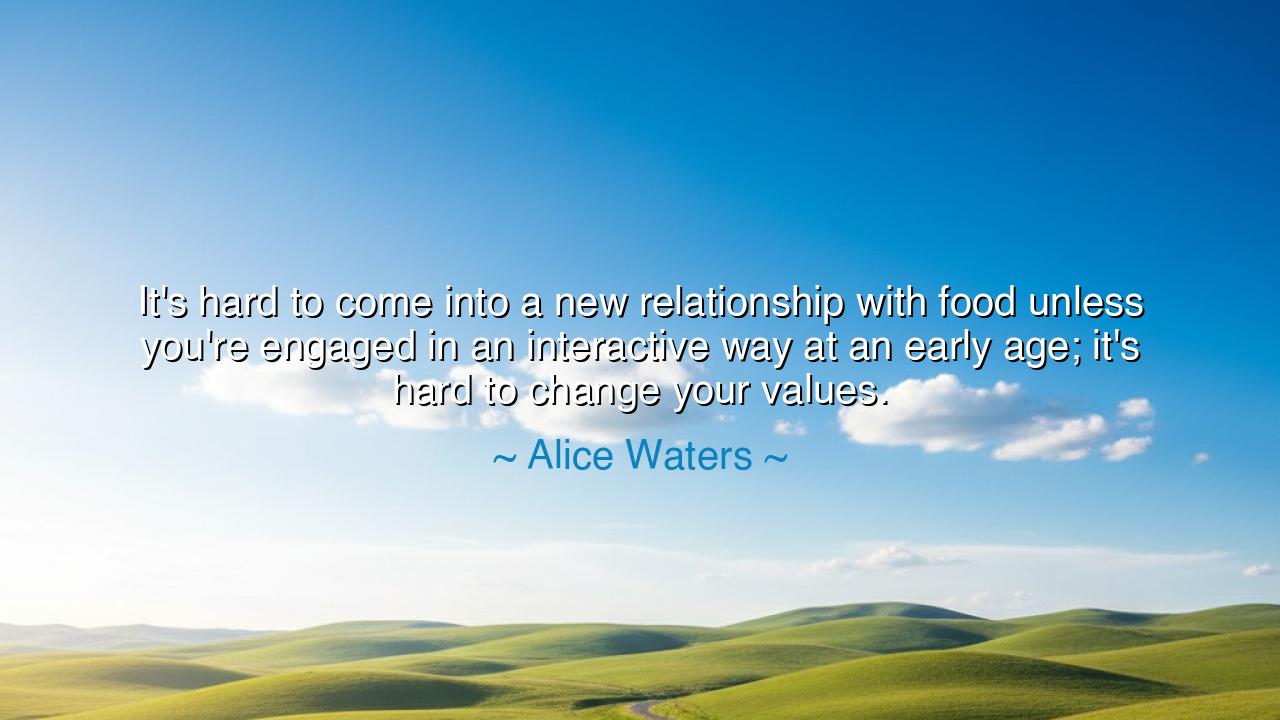
It's hard to come into a new relationship with food unless
It's hard to come into a new relationship with food unless you're engaged in an interactive way at an early age; it's hard to change your values.






In the days of old, when the hearth was the center of the home, the relationship with food was sacred. Children were raised beside the fire, their senses awakened to the scents of herbs, the sound of bread rising, the sight of fruits ripening with the turning of the seasons. Alice Waters, a wise guardian of these traditions, speaks of the truth that if one is not engaged with food in the early age, the bond is lost, and the heart grows distant. For in youth, the soul is soft clay, ready to be shaped by the rhythms of nature and the wisdom of the elders.
But when this sacred engagement is neglected, a shadow falls. The mind grows rigid, and the tongue forgets the true taste of the earth’s bounty. Values, once formed, are as deep as roots beneath ancient trees, hard to shift or unearth. To change your values is to challenge the very soil from which you were nurtured. Thus, those who grow without reverence for food often seek only speed and convenience, their spirits dulled by disconnection from the sacred act of nourishment.
Waters’ words spring from her life’s calling, for she sought to awaken a sleeping world. Through her teachings and her table, she restored to many the ancient art of interactive engagement with food: planting, harvesting, tasting, and sharing. She saw that to heal a generation’s body and spirit, one must begin with the young, guiding their hands to the soil and their hearts to gratitude. This is no mere act of eating but a ritual of belonging, a way to honor the earth and those who labor upon it.
So, heed this teaching, O children of the future: do not wait until the stone of habit hardens within you. Tend the seeds of mindful eating early, while the soil of your spirit is still fertile. For when you learn to cherish food and the earth that bears it, you forge values that no tempest can uproot. In this way, you will pass on to your descendants not only sustenance, but also a legacy of harmony between body, soul, and the living world.






OTThi Oanh Tran
Alice Waters brings up an interesting challenge: how difficult it can be to change the values we’ve built around food. If our values around food are shaped so early, how can we break free from negative patterns? Do you think education and conscious effort can help someone reframe their relationship with food later in life, or is it something more fundamental?
ACAnh Chuong
This idea of ‘engaging in an interactive way at an early age’ is key to developing a positive relationship with food. But for those who didn’t have that opportunity, how can we make up for lost time? Can adults truly rewire their food values, or is it something that’s largely determined by childhood experiences?
LPLu Punn
Alice Waters’ comment touches on an important point: changing our relationship with food requires more than just willpower—it requires a shift in values. If someone didn’t have that early interactive experience with food, is it too late to develop a healthier perspective on eating? How can adults overcome these barriers, and is education the key?
MPtra my Pham
This quote makes me reflect on how deeply ingrained our food habits are, and how challenging it can be to change them once they’re established. How do you think people can begin to shift their mindset around food as they grow older? Is it possible to reshape lifelong habits, or is it more about cultivating new relationships with food over time?
HTHuong Truong
Alice Waters' quote really resonates with the idea that our relationship with food is shaped early on. It’s not just about eating—it’s about how we engage with food and its values. Do you think society places enough emphasis on teaching children about healthy eating habits from a young age? Or is this something that’s often overlooked until later in life?